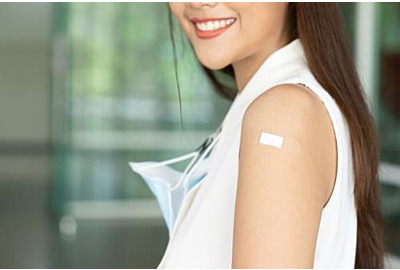After a full coronavirus vaccination, many people are extremely relieved at being better protected and their risk of getting seriously ill is minimised. This is a real milestone in keeping millions of people healthy. Nevertheless, one thing will remain: the established practices for hygiene will still be part of our everyday lives in the future.
Vaccinations are progressing and the effect is visible
Millions of people around the world have received their vaccination, and the vaccines appear to be working well. According to current findings, the vaccines are also effective against the newly emerged delta variant.
Fully vaccinated persons are generally well protected against severe cases, which is encouraging news. However, those who have been vaccinated may still suffer from mild to moderate symptoms - usually no worse than a cold – if they become infected with Covid-19. In some cases, the infection proceeds asymptomatically. All this is not too bad. However, those who are infected are likely to be contagious and thus pose a risk to those who have not yet been fully vaccinated.
World Health Organization still recommends hygiene measures
For this reason, the World Health Organization recommends maintaining good everyday hygiene even after vaccination. On its website, the WHO explains: “Safe and effective vaccines are a game-changing tool: but for the foreseeable future we must continue wearing masks, cleaning our hands, ensuring good ventilation indoors, physically distancing and avoiding crowds.
Being vaccinated does not mean that we can throw caution to the wind and put ourselves and others at risk, particularly because research is still ongoing into how much vaccines protect not only against disease but also against infection and transmission.” That is why the WHO clearly advises continuing to wear masks, cleaning hands regularly and keeping your distance.
The good news is that hygienepractices that have been put into have become second nature to many of us. Especially in the current travel season, many people pay attention on how hygienic things are around them. This is confirmed by a recent survey of the hotel industry conducted by Hospitality Net together with Knowingli Market Research. For example, travelers are paying more attention to whether washrooms are clean and have safety protocols that indicate frequent cleaning intervals. Guests also prefer to see sufficient hand sanitiser dispensers in hotels and restaurants.
Touch-free systems for hand hygiene are gaining in importance
When it comes to hand sanitiser dispensers, hotel guests prefer touch-free systems, according to the survey, and for good reason! Touch free dispensers do not get touched by dozens of hands. Instead, guests hold their hands under an integrated motion sensor, which automatically dispenses the optimum amount of hand sanitiser gel.
GOJO® Touch-Free dispensers for soap, and PURELL® touch-free hand sanitiser dispensers are available in various designs and colors. The systems can be filled with 700 or 1200 ml cartridges. The touch-free dispensers are designed for wall mounting, but can easily be converted into free-standing, mobile dispenser towers.
However, it is important that these are filled with effective gels for hand sanitising. When choosing a hand sanitiser, it's all about the right formula. Well balanced formulas, like the products from PURELL, do not dry out the skin - not even during intensive use. At the same time, they are effective against 99.9 percent of all harmful pathogens. Germs really don't stand a chance.
Stay healthy!













